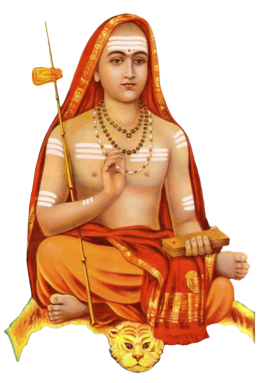प्राप्तोऽज्ञानाज्जननमरणक्लेशसंपातहेतुः ।
येनैवायं वपुरिदमसत्सत्यमित्यात्मबुद्ध्या
पुष्यत्युक्षत्यवति विषयैस्तन्तुभिः कोशकृद्वत् ॥ १३७ ॥
prāpto’jñānājjananamaraṇakleśasaṃpātahetuḥ |
yenaivāyaṃ vapuridamasatsatyamityātmabuddhyā
puṣyatyukṣatyavati viṣayaistantubhiḥ kośakṛdvat || 137 ||
Sense-objects .—He runs after sense-pleasures thinking that will conduce to the well-being of the body, but these in turn throw him into a terrible bondage, and he has to abjure them wholly to attain his freedom, as the caterpillar has to cut through its cocoon.
विवेकाभावाद्वै स्फुरति भुजगे रज्जुधिषणा ।
ततोऽनर्थव्रातो निपतति समादातुरधिकः
ततो योऽसद्ग्राहः स हि भवति बन्धः शृणु सखे ॥ १३८ ॥
vivekābhāvādvai sphurati bhujage rajjudhiṣaṇā |
tato’narthavrāto nipatati samādāturadhikaḥ
tato yo’sadgrāhaḥ sa hi bhavati bandhaḥ śṛṇu sakhe || 138 ||
स्फुरन्तमात्मानमनन्तवैभवम् ।
समावृणोत्यावृतिशक्तिरेषा
तमोमयी राहुरिवार्कबिम्बम् ॥ १३९ ॥
sphurantamātmānamanantavaibhavam |
samāvṛṇotyāvṛtiśaktireṣā
tamomayī rāhurivārkabimbam || 139 ||
अनात्मानं मोहादहमिति शरीरं कलयति ।
ततः कामक्रोधप्रभृतिभिरमुं बन्धनगुणैः
परं विक्षेपाख्या रजस उरुशक्तिर्व्यथयति ॥ १४0 ॥
anātmānaṃ mohādahamiti śarīraṃ kalayati |
tataḥ kāmakrodhaprabhṛtibhiramuṃ bandhanaguṇaiḥ
paraṃ vikṣepākhyā rajasa uruśaktirvyathayati || 140 ||
धियो नानावस्थां स्वयमभिनयंस्तद्गुणतया ।
अपारे संसरे विषयविषपूरे जलनिधौ
निमज्योन्मज्यायं भ्रमति कुमतिः कुत्सितगतिः ॥ १४१ ॥
dhiyo nānāvasthāṃ svayamabhinayaṃstadguṇatayā |
apāre saṃsare viṣayaviṣapūre jalanidhau
nimajyonmajyāyaṃ bhramati kumatiḥ kutsitagatiḥ || 141 ||
Samsâra—the entire relative existence.
Up and down: sinking and rising.—Acquiring different bodies such as the angelic or the animal, according to the good and bad deeds performed, and enjoying or suffering therein.
भानुं तिरोधाय विजृम्भते यथा ।
आत्मोदिताहंकृतिरात्मतत्त्वं
तथा तिरोधाय विजृम्भते स्वयम् ॥ १४२ ॥
bhānuṃ tirodhāya vijṛmbhate yathā |
ātmoditāhaṃkṛtirātmatattvaṃ
tathā tirodhāya vijṛmbhate svayam || 142 ||
Vivekachudamani – Introduction
1: Devoted Dedication
2: Glory of Spiritual Life
3: Unique Graces in Life
4-7: Miseries of The Unspiritual Man
8-13: Means of Wisdom
14-17: The Fit Student
18-30: The Four Qualifications
31: Bhakti – Firm and Deep
32-40: Courtesy of Approach and Questioning
41-47: Loving Advice of the Guru
48-49: Questions of the Disciple
50: Intelligent Disciple – Appreciated
51-55: Glory of Self-Effort
56-61: Knowledge of the Self-Its Beauty
62-66: Direct Experience – Liberation
67-71: Discussion on Questions Raised
72-75: Gross Body
76-82: Sense Objects a Trap – Man Bound
83-86: Fascination for Body Criticised
87-91: Gross Body Condemned
92: Organs of Perception and Action
93-94: Inner Instruments
95: The Five Pranas
96-101: Subtle Body – Effects
102: Functions of Prāna
103-105: Ego Discussed
106-107: Infinite Love – the Self
108-110: Māyā – Pointed Out
111-112: Rajoguņa – Nature and Effects
113-116: Tamoguņa – Nature and Effects
117-119: Sattvaguņa – Nature and Effects
120-121: The Causal Body – Its Nature
122-123: Not-Self – Description
124-135: The Self – Its Nature
136: Advice for Self-control
137-142: What is Bondage – The Reply
143-144: The Powers – Agitation and Veiling
145-146: Bondage in Action
147-153: Ātman and Anātman – Discrimination
Negation of the Kośas
154-164: – Annamaya kośa (Food sheath)
165-166: – Prņamaya kośa (Vital air sheath)
167-183: – Manomaya kosa (Mental sheath)
184-188: – Vijnanamaya kośa (Intellectual sheath)
189-191: Ātman – Unattached
192-193: What is Liberation? – Disciple
194-206: Self-Knowledge gives Liberation
207-210: Anandamaya kośa (Bliss sheath)
211: Ātman – Other than the Five Kośas
212: What is Ātman? – Disciple
213-225: Nature of the Self – Discussion
226-236: All Manifestation Absolute
237-240: Brahman – Its Nature
241-249: That Thou Art – Explanation
250-253: Attitude in Meditation
254-266: Aids to Meditation
267-276: Give up Vāsanās – the Method
277-292: End Superimposition – The Means
293-297: The Perceived I’ Factor – False
298-309: Condemnation of the Ego
310-319: Actions, Thoughts and Vāsanās – Renounce
320-329: Total Vigilance – Its Price
330-338: In the One, No Plurality
339-348: Spiritual Growth – the Secret
349-353: Cause-Effect – False
354-372: Samadhi – Its Nature
373-378: Fully Detached – Samadhi Easy
379-383: Meditation – the Technique
384-397: Continuous Attention to Self
398-406: No Diversity in Reality
407-413: Ātma-vicāra – Contemplation
414-418: Give up Perceptions
419-425: The Science of Reality – Its Benefits
426-445: Signs of a Realised Seer
446-464: Prārabdha for a Saint
465-471: There is No Plurality
472-479: Experience of Selfhood
480-520: Practice of Knowledge – Disciple
521-575: Final Words of Advice
576-578: Blessed Disciple Liberated
579-581: The Glory of the Textbook

Vivekachudamani – Verses 137-142 – Vivekachudamani Verses 137-142 – By Adi Sankaracharya – In Sanskrit with English Meaning, Transliteration, Translation, Commenary, Lyrics, Audio – Vivekachudamani-137-142
